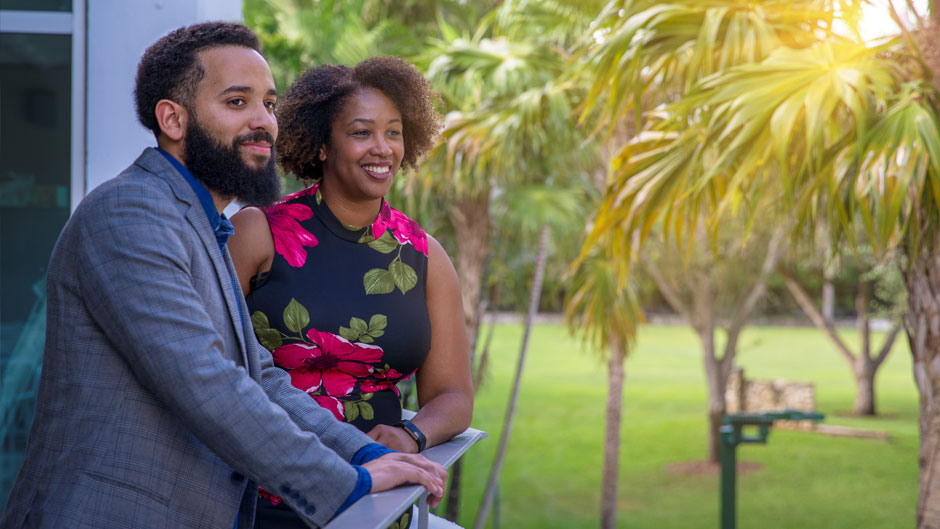Underrepresentation, social isolation, academic hurdles, and racial stereotypes are just some of the challenges students of marginalized identities often face at predominately white institutions (PWIs).
Junior Pena, assistant director of the University of Miami’s Office of Multicultural Student Affairs, was once a first-generation college student from a low-income single-parent home who encountered such challenges, along with his own set of roadblocks, during his undergraduate career at a PWI. But what allowed him to persist were mentors and administrators who collectively made him feel at home.
Today, Pena and MSA Director Renée Dickens Callan are using that same strategy to support the nearly 38 percent of multicultural students enrolled at UM.
“Our goal is to create strategies, develop programming and foster an environment that can help students acquire the skills and confidence needed to navigate college,” Dickens Callan said. “Someone believed in us and said you can do this. You can be successful. You can get through this. Someone did that for each of us. So, we’re constantly looking at how we can provide the same support for the students. They know they can come to us if they have questions or concerns, if they want to share what is happening in their lives, or need help connecting to the right people.”
The work of MSA is to advocate for students and assist with activities related to the recruitment, retention, and successful matriculation of ethnically diverse students. The office offers students information that will catapult their learning experiences. This includes educational programs, support services, student organization advisement, provide diversity, equity, and inclusion initiatives that are unique to their experiences.
While some gains have been achieved in closing the educational gap, students of color are still underrepresented in higher education and face certain obstacles. Getting historically underrepresented and marginalized students enrolled into college is only half the battle.
“Once students arrive on campus, we lose sight of the fact that getting them here isn’t the only issue,” Pena said. “If you feel more comfortable as a person and understand who you are, then you’re going to show up more confidently in your classes. The work that we do in this space complements what students are doing in the classroom.”
Dickens Callan, the daughter of a fervent teacher of 42 years, believes in setting high standards for what students can achieve at the university level. The ardent director encourages students to take educational risks and sharpen their academic skills by setting high standards for themselves.
“Setting high expectations and providing support is important and helps students to see what is possible and know that they are capable,” she said. “We continually strive to create that type of environment in our office.”
Dickens Callan, Pena, and MSA’s support staff work tirelessly to host programming—some of it of an impromptu nature—for students to voice their feelings and concerns in a welcoming space. Some students of color experience college environments where they feel as if they do not always belong. Whether they are the only woman in their academic program or the only student of color living on a Residential College floor, or they are beginning to think about their identity and how the navigate their community, MSA is there to listen and give reliable advice.
Through their MSA Real Talk series, an intimate setting is provided to discuss such topics as mental health, community issues, media representation, social justice, and more.
“We try to create a family. We listen a lot. I’d say 95 percent of what we do is student initiated and student-run. I’m particularly proud of the fact that we try to put students at the forefront,” Dickens Callan said.
MSA will soon be hosting its annual Diversity Week, which features a variety of events that allow students to express their identities, experiences, and realities through talent and reflection. The week of festivities kicks off on November 5.
Dickens Callan said she is always listening, reading about best practices and determining how her department can contribute to UM President Julio Frenk’s Roadmap to Our New Century initiative.
“We have immediate and long-term goals both in programming and support services,” Dickens Callan said. “As we learn more about the strategic plan and the Roadmap, we will continue to create innovative practices that contribute to a culture of belonging and support institutional excellence.”
MSA will continue to provide tools for students to advance and take with them on their journey of education at UM and eventually beyond. From Horizons, a pre-orientation program designed to assist new multicultural students, through graduation, MSA will be there.
“Oftentimes we have conversations about what students of marginalized identities don’t have,” said Pena. “But really our mission is to highlight what they do well, highlight the amazing work that they are doing, the contributions they make to a campus community and what they can contribute to dialogues, to classroom experiences, and to the exchange of realities with other students.”
Said Dickens Callan, “Seeing alumni come back to campus and share what they’re doing, that’s testament to the impact we had on them as students.”

